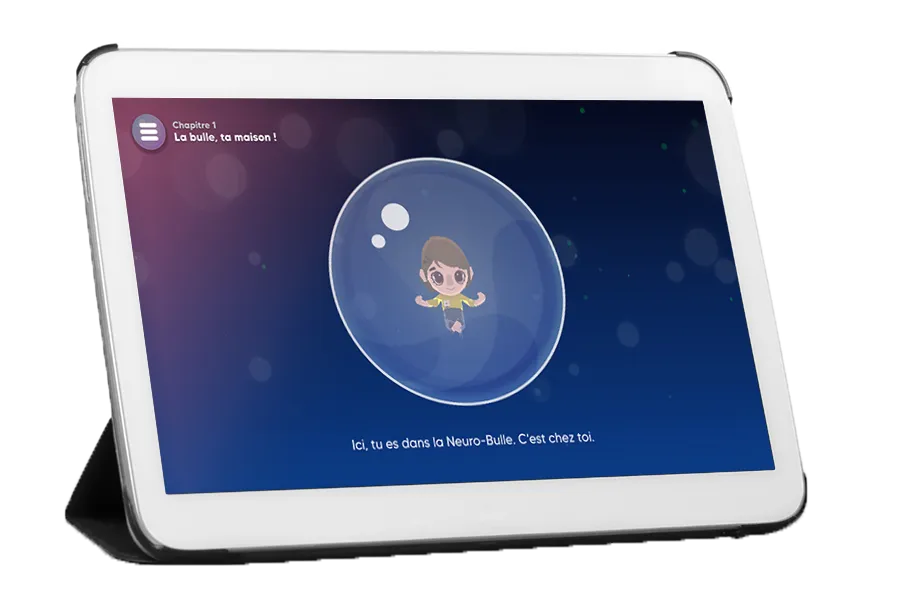How to create a work-friendly environment
A well-thought-out environment is the key to helping your child focus on homework. Start by setting up a suitable place: a quiet, well-lit area away from distractions. The space should be comfortable and functional, avoiding any uncomfortable position over time, such as on a coffee table. Make sure that all necessary materials are within the child’s reach: books, pens, pencils… to avoid unnecessary interruptions while working.
➡️ Wondering which foods to favor and which to avoid to promote children’s cognitive development? Check out our article on brainfood!
Plan and organize homework
A clear schedule lets the child know what he has to do. This allows him to organize his time efficiently.
- Make a timetable: define time slots dedicated to homework each day. Make sure the child knows exactly when and what to do.
- Prioritize tasks : help your child identify the most urgent or difficult homework, and do it first. Encourage him to evaluate tasks and determine which ones need immediate attention. For example, an assignment due the next day should be dealt with before a task due in a few days.
- Take breaks: plan short breaks to allow the child to recharge and return to homework with a fresh mind. Encourage active breaks, such as a small snack or short physical activity, to help maintain concentration. That’s right Sports are great for kids’ brains.
- Establish a routine: creating a daily routine can help the child know what to expect and create a work habit. For example, helping your child plan what he can do over the weekend to get ahead not only helps spread the workload, but also ensures that he’ll have “nothing left to review” the night before a test. This approach helps to reduce stress and improve time management.
- On weekends, respect the child’s rhythm: some work better in the morning, while others are more focused in the evening. Adapt the homework schedule to your child’s natural rhythm.
Babaoo’Tips💡
- Accompany your child in using his or her textbook, diary or calendar to record homework assignments and their due dates. This is essential for visualizing the tasks at hand and planning accordingly. In addition, it can be useful to post a schedule on the fridge or in another visible place in the house, where more distant deadlines are clearly indicated. This allows the child, as well as the whole family, to keep an eye on important deadlines. 📅
- Also encourage the use of color codes for different subjects or tasks, to make planning visually clearer and more organized.
7 creative solutions to make homework more fun
For parents and children alike, homework can quickly turn into a chore. But it doesn’t have to be that way! Here are 8 ideas to break the routine.
- Visualize
Use drawings, diagrams or mind maps to make information more digestible and visually appealing. These visual elements can help to better understand and remember information, as well as making homework more interesting. Software such as Xmind, for example, lets you create mind maps for free. For others, learning can be done through song: enough to make learning definitions, conjugations or even multiplication tables more fun!
- Test regularly
Create subject-related quizzes or riddles to test knowledge in a fun way. Whether they take the form of handmade “question-answer” flashcards on paper, or interactive quizzes created with apps, quizzes help review, reinforce memory and make learning more dynamic and interactive. Create challenges or goals to achieve to stimulate motivation and the desire to excel.
- Motivate with rewards
Set up a reward system. Make room for creativity! You can plan surprises to motivate and encourage the child to finish his homework. Choose non-material rewards to boost intrinsic motivation. For example, suggest baking a cake together as soon as homework is finished.
- Vary learning methods
Change methods regularly to avoid monotony. Alternate between reading, writing, games and hands-on activities to keep the child interested and curious.
- Learn with your child
Participating in homework with your child means rediscovering the world through his or her eyes. An opportunity to explore together, and learn new things alongside him. Your curiosity can be contagious, inspiring your child to explore with enthusiasm. And who knows? By revisiting certain subjects, you might awaken your own thirst for learning… but be careful not to do things for him. 😊
- Give it a shot!
A little movement can help dispel stress, revitalize your child’s energy and improve concentration. You can, for example, take short breaks for stretching exercises, or even a quick game that involves movement.
This not only makes homework time more dynamic, but also helps your child associate learning with moments of fun and relaxation. It’s an effective way to break the monotony.
- Bonus tip: use educational games
Incorporate puzzles, crosswords or educational online games to stimulate thinking and logic in a fun way. They can be used as rewards after doing homework or during breaks. Also exploit educational apps and websites that offer interactive exercises and lessons.
How to deal with a child’s stress and frustration
It’s perfectly normal for children to feel stress or frustration when faced with homework. It’s important to help them and stay in tune with them. Don’t put too much pressure on them and respect their pace. Creating an environment where they feel understood and supported helps to reassure them and encourage them to express their feelings and concerns. Also focus on their progress, celebrate small victories and help them recognize and be proud of their own achievements. In the event of a crisis or block, encourage your little one to take a break, relax to refocus before resuming.
✏ Note: managing emotions is as important as mastering knowledge. 🌟
The Babaoo recap
Getting to grips with homework isn’t mission impossible! 🚀 Plan and organize tasks to give your child a clear vision of what needs to be done. Create a serene work environment conducive to concentration, and don’t hesitate to incorporate a touch of creativity and playfulness to make learning more appealing. Stay in tune with your children, value their efforts and guide them through moments of stress and frustration. Remember, every little step counts, and together you can turn homework into an enriching experience full of discovery.





